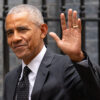“[W]e are not as safe as we should be,” Christopher Harmon notes in chapter one of his new book, A Citizen’s Guide to Terrorism and Counterterrorism.
Harmon focused on his two reasons for writing the book during his lecture Tuesday afternoon at The Heritage Foundation. His first reason and “the joy of the book” is to tell the stories of brave Americans who have personally fought against terrorism, both the professionals and the ordinary citizens who saw something suspicious and took action. The second reason is to “give a fuller perspective” of the U.S. government’s “grand strategy” for defeating terrorism.
The book is written under the presupposition that the United States is at war. Acknowledging this fact dispels many legal questions that would otherwise exist. Although terrorists are motivated by religion, Harmon contends that it is not a religious war because religion is not a factor for the U.S.
Harmon also discussed the various tools of the government’s antiterrorism strategy: intelligence, law, economics, military, and diplomacy, to which he gave particular attention. Diplomacy will not dissolve the threat of terrorism on its own, but it is the first step. U.S. efforts in public diplomacy are not succeeding. Every year, the U.S. spends millions on broadcasting to Arab nations, but it doesn’t know what to say, Harmon says, because we are embarrassed of our ideals and afraid to alienate the population. The U.S. should point out, for instance, that more Muslims in other countries are killed in terrorist attacks than Americans. As The Heritage Foundation has argued, the “struggle against radical Islamists will never be won unless Muslims themselves become as outraged as non-Muslims when terrorists kill in the name of Islam.”
Harmon suggests that the U.S. improve public diplomacy and devote more energy to capturing and/or killing Aiman al-Zawahiri, who took over the leadership of al-Qaeda after the death of Osama bin Laden. The long war will not end until he ceases to have control—a fact Harmon says is ignored by the Obama Administration.
Amanda Hall is currently a member of the Young Leaders Program at The Heritage Foundation. For more information on interning at Heritage, please click here.

























